
Hendrik Meyer
@hendrikmeyer.bsky.social
Research Associate | PhD Candidate | Hamburg University
Political & Climate (Protest) Communication
Website: https://www.hendrik-meyer.com
Google Scholar: https://scholar.google.com/citations?user=j3fDB9oAAAAJ&hl=en
Political & Climate (Protest) Communication
Website: https://www.hendrik-meyer.com
Google Scholar: https://scholar.google.com/citations?user=j3fDB9oAAAAJ&hl=en
– Horizontal protectionism (e.g., migration critique, gender/wokeness) was least frequent (~30%).
– AfD dominance: higher overall engagement rate and far greater output (from accounts with ≥100k lifetime likes) than all other German parties combined.
– AfD dominance: higher overall engagement rate and far greater output (from accounts with ≥100k lifetime likes) than all other German parties combined.

October 7, 2025 at 8:03 AM
– Horizontal protectionism (e.g., migration critique, gender/wokeness) was least frequent (~30%).
– AfD dominance: higher overall engagement rate and far greater output (from accounts with ≥100k lifetime likes) than all other German parties combined.
– AfD dominance: higher overall engagement rate and far greater output (from accounts with ≥100k lifetime likes) than all other German parties combined.
📈 Results: What Was Posted & What Drives Engagement?
– Anti-elitism and out-group attacks generated higher per-video engagement.
– Yet most content leaned toward anti-elite messages or concern-focused themes (economy/inflation, security, rights/freedoms).
– Anti-elitism and out-group attacks generated higher per-video engagement.
– Yet most content leaned toward anti-elite messages or concern-focused themes (economy/inflation, security, rights/freedoms).
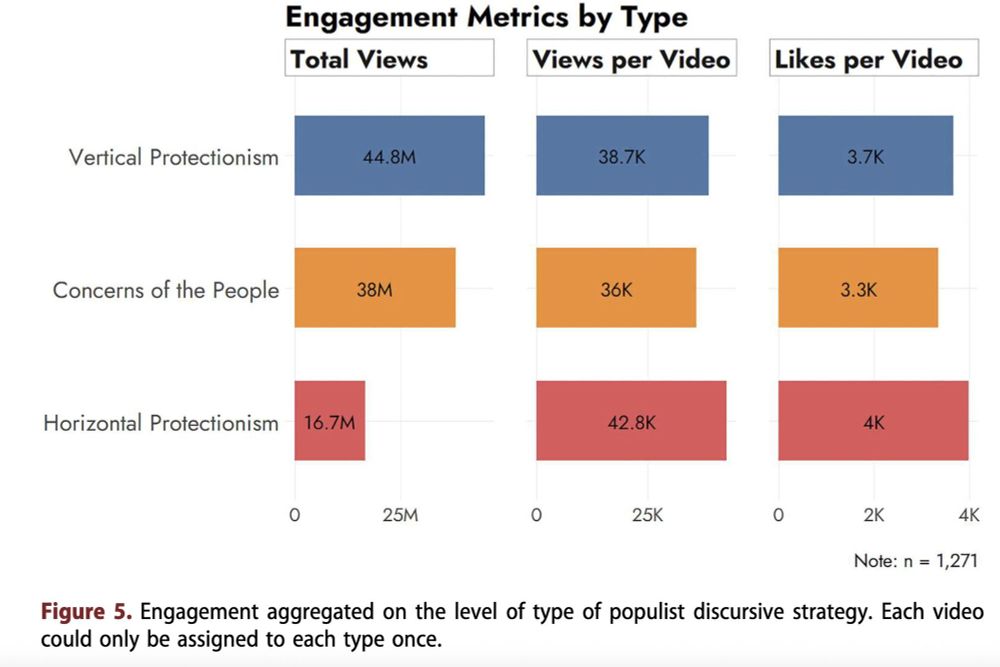
October 7, 2025 at 8:03 AM
📈 Results: What Was Posted & What Drives Engagement?
– Anti-elitism and out-group attacks generated higher per-video engagement.
– Yet most content leaned toward anti-elite messages or concern-focused themes (economy/inflation, security, rights/freedoms).
– Anti-elitism and out-group attacks generated higher per-video engagement.
– Yet most content leaned toward anti-elite messages or concern-focused themes (economy/inflation, security, rights/freedoms).
🧩 Populist Themes & Types (theory-grounded)
We identified 12 themes organized into 3 populist types:
1. Horizontal protectionism (identity/out-group: migrants, “wokeism”)
2. Vertical protectionism (anti-elitism/anti-institutionalism)
3. Concerns of the people (economy/inflation, security, freedoms)
We identified 12 themes organized into 3 populist types:
1. Horizontal protectionism (identity/out-group: migrants, “wokeism”)
2. Vertical protectionism (anti-elitism/anti-institutionalism)
3. Concerns of the people (economy/inflation, security, freedoms)

October 7, 2025 at 8:03 AM
🧩 Populist Themes & Types (theory-grounded)
We identified 12 themes organized into 3 populist types:
1. Horizontal protectionism (identity/out-group: migrants, “wokeism”)
2. Vertical protectionism (anti-elitism/anti-institutionalism)
3. Concerns of the people (economy/inflation, security, freedoms)
We identified 12 themes organized into 3 populist types:
1. Horizontal protectionism (identity/out-group: migrants, “wokeism”)
2. Vertical protectionism (anti-elitism/anti-institutionalism)
3. Concerns of the people (economy/inflation, security, freedoms)
Excited to share our new #OpenAccess article in Information, Communication & Society:
“Beyond anti-elitism and out-group attacks: How concerns shape the AfD’s #populist representation on German #TikTok during the 2024 #EU #elections”
/w @julialenz.bsky.social, L. Rodeck & @drfell.bsky.social
(⬇️ 🧵)
“Beyond anti-elitism and out-group attacks: How concerns shape the AfD’s #populist representation on German #TikTok during the 2024 #EU #elections”
/w @julialenz.bsky.social, L. Rodeck & @drfell.bsky.social
(⬇️ 🧵)

October 7, 2025 at 8:03 AM
Excited to share our new #OpenAccess article in Information, Communication & Society:
“Beyond anti-elitism and out-group attacks: How concerns shape the AfD’s #populist representation on German #TikTok during the 2024 #EU #elections”
/w @julialenz.bsky.social, L. Rodeck & @drfell.bsky.social
(⬇️ 🧵)
“Beyond anti-elitism and out-group attacks: How concerns shape the AfD’s #populist representation on German #TikTok during the 2024 #EU #elections”
/w @julialenz.bsky.social, L. Rodeck & @drfell.bsky.social
(⬇️ 🧵)
📢 Happy to see this #OpenAccess paper out in #Journalism!
"From disruptive protests to disrupted news frames: Comparing German news on climate protests"
with @mikefarjam.bsky.social, Helena Rauxloh & Michael Brüggemann
"From disruptive protests to disrupted news frames: Comparing German news on climate protests"
with @mikefarjam.bsky.social, Helena Rauxloh & Michael Brüggemann

September 9, 2025 at 10:10 AM
📢 Happy to see this #OpenAccess paper out in #Journalism!
"From disruptive protests to disrupted news frames: Comparing German news on climate protests"
with @mikefarjam.bsky.social, Helena Rauxloh & Michael Brüggemann
"From disruptive protests to disrupted news frames: Comparing German news on climate protests"
with @mikefarjam.bsky.social, Helena Rauxloh & Michael Brüggemann
Concerning cross-group interaction, mentions and replies from antagonists to users within the protest supporter networks showed significantly more toxicity.
Antagonists were twice as toxic when addressing supporters than when talking to each other—especially so in debates about disruptive protests.
Antagonists were twice as toxic when addressing supporters than when talking to each other—especially so in debates about disruptive protests.
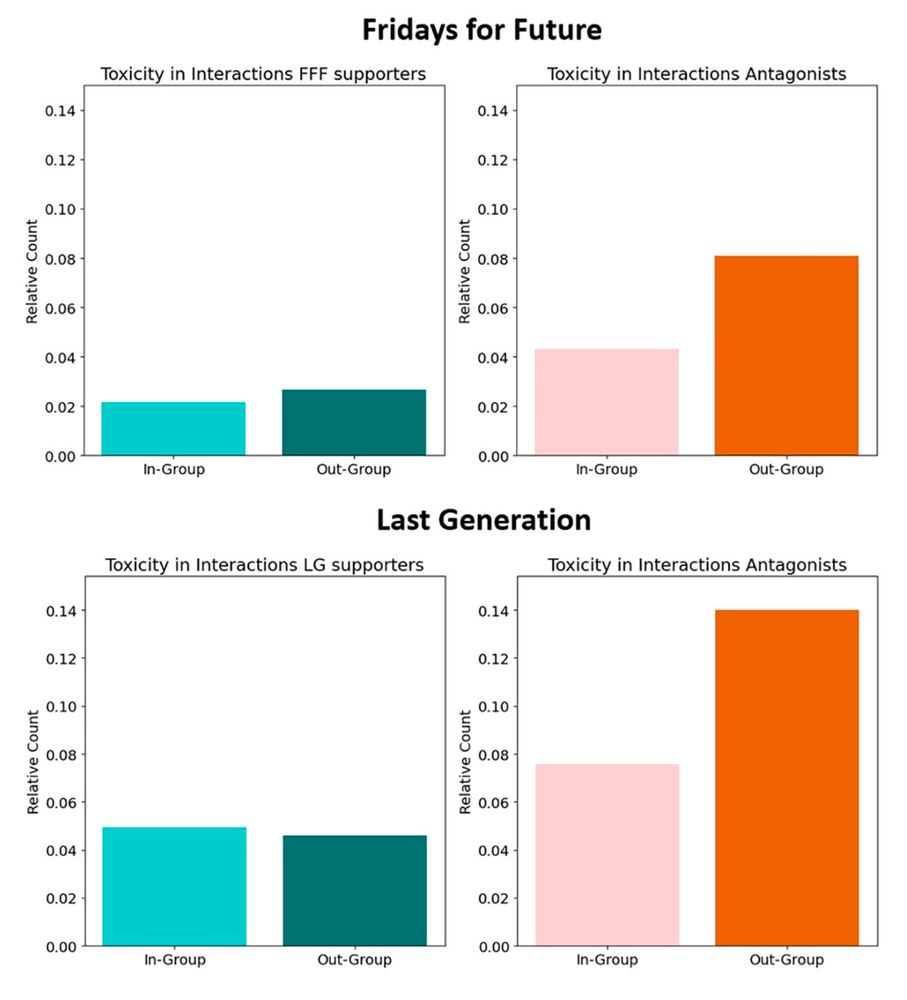
May 20, 2025 at 3:04 PM
Concerning cross-group interaction, mentions and replies from antagonists to users within the protest supporter networks showed significantly more toxicity.
Antagonists were twice as toxic when addressing supporters than when talking to each other—especially so in debates about disruptive protests.
Antagonists were twice as toxic when addressing supporters than when talking to each other—especially so in debates about disruptive protests.
Retweet networks show clear ideological clustering.
In the Fridays for Future debate, supportive communities were larger and more diverse.
In the Letzte Generation debate, the network was more evenly split between supporters and antagonists.
In the Fridays for Future debate, supportive communities were larger and more diverse.
In the Letzte Generation debate, the network was more evenly split between supporters and antagonists.

May 20, 2025 at 3:04 PM
Retweet networks show clear ideological clustering.
In the Fridays for Future debate, supportive communities were larger and more diverse.
In the Letzte Generation debate, the network was more evenly split between supporters and antagonists.
In the Fridays for Future debate, supportive communities were larger and more diverse.
In the Letzte Generation debate, the network was more evenly split between supporters and antagonists.
Supporters and critics of climate protests used radically opposed frames.
In both debates, antagonists attacked protesters while supporters called for climate action & defended protests.
Both debates were asymmetrically polarized—disruptive protest debates showed greater "Discursive Polarization":
In both debates, antagonists attacked protesters while supporters called for climate action & defended protests.
Both debates were asymmetrically polarized—disruptive protest debates showed greater "Discursive Polarization":
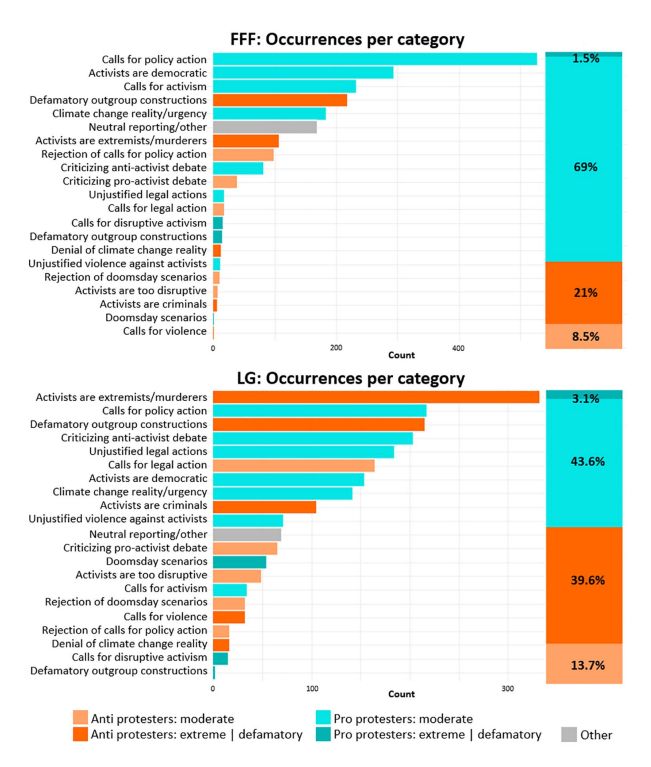
May 20, 2025 at 3:04 PM
Supporters and critics of climate protests used radically opposed frames.
In both debates, antagonists attacked protesters while supporters called for climate action & defended protests.
Both debates were asymmetrically polarized—disruptive protest debates showed greater "Discursive Polarization":
In both debates, antagonists attacked protesters while supporters called for climate action & defended protests.
Both debates were asymmetrically polarized—disruptive protest debates showed greater "Discursive Polarization":
New in Social Media + Society:
How do (non-)disruptive #climate #protests shape social media debates?
We analyzed ~5M Twitter/X posts on #FFF & #LetzteGeneration: Disruptive protests generate more engagement—but also more polarization, driven by right-wing/conservative users: doi.org/10.1177/2056...
How do (non-)disruptive #climate #protests shape social media debates?
We analyzed ~5M Twitter/X posts on #FFF & #LetzteGeneration: Disruptive protests generate more engagement—but also more polarization, driven by right-wing/conservative users: doi.org/10.1177/2056...
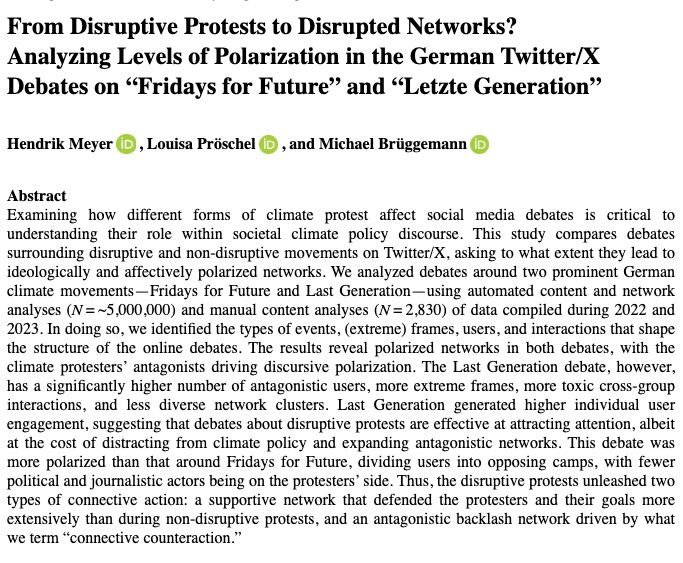
May 20, 2025 at 3:04 PM
New in Social Media + Society:
How do (non-)disruptive #climate #protests shape social media debates?
We analyzed ~5M Twitter/X posts on #FFF & #LetzteGeneration: Disruptive protests generate more engagement—but also more polarization, driven by right-wing/conservative users: doi.org/10.1177/2056...
How do (non-)disruptive #climate #protests shape social media debates?
We analyzed ~5M Twitter/X posts on #FFF & #LetzteGeneration: Disruptive protests generate more engagement—but also more polarization, driven by right-wing/conservative users: doi.org/10.1177/2056...
@pzerrer.bsky.social did a great job at #DGPUK2025 presenting initial findings from our #trackingdata research investigating how #climatechange topic consumption is linked to political participation & mobilization! With Vasilisa Kuznetsova, @cbpuschmann.bsky.social, @lisamerten.bsky.social
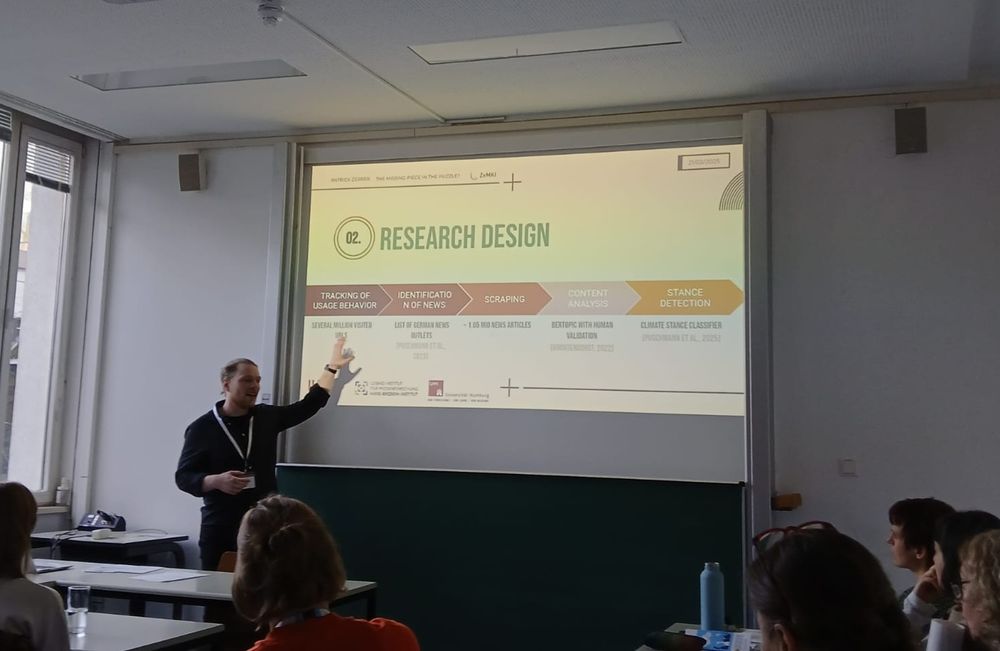
March 22, 2025 at 12:45 PM
@pzerrer.bsky.social did a great job at #DGPUK2025 presenting initial findings from our #trackingdata research investigating how #climatechange topic consumption is linked to political participation & mobilization! With Vasilisa Kuznetsova, @cbpuschmann.bsky.social, @lisamerten.bsky.social
This pledge for a European and/or transnational, non-commercial social media platform, which I originally posted on a now-defunct platform in 2023, has aged like fine wine ... So I decided to repost it here.

February 15, 2025 at 1:59 PM
This pledge for a European and/or transnational, non-commercial social media platform, which I originally posted on a now-defunct platform in 2023, has aged like fine wine ... So I decided to repost it here.
The AfD’s success on TikTok—in our data, generating more engagement than all other parties combined—is linked to strategic messaging: it merges divisive content with relatable concerns about inflation, individual rights or security. --> Potential shift in (elite) right-wing populist tactics online.

November 19, 2024 at 2:27 PM
The AfD’s success on TikTok—in our data, generating more engagement than all other parties combined—is linked to strategic messaging: it merges divisive content with relatable concerns about inflation, individual rights or security. --> Potential shift in (elite) right-wing populist tactics online.
Alongside its typical anti-elite rhetoric, our findings reveal that the AfD strongly emphasizes voters' (supposed) concerns, such as financial anxieties and security issues.

November 19, 2024 at 2:27 PM
Alongside its typical anti-elite rhetoric, our findings reveal that the AfD strongly emphasizes voters' (supposed) concerns, such as financial anxieties and security issues.
With rightwing populism rising and German elections coming earlier, feels like the perfect time to share our working paper: 'Beyond Anti-Elitism & Out-Group Attacks: How Concerns Shape the AfD’s Populist Representation on TikTok During 2024 EU Elections' w/@julialenz.bsky.social @drfell.bsky.social

November 19, 2024 at 2:27 PM
With rightwing populism rising and German elections coming earlier, feels like the perfect time to share our working paper: 'Beyond Anti-Elitism & Out-Group Attacks: How Concerns Shape the AfD’s Populist Representation on TikTok During 2024 EU Elections' w/@julialenz.bsky.social @drfell.bsky.social
What is Discursive Polarization and how does it relate to established #polarization concepts within (political) communication studies? Michael Brüggemann and I illustrated this in an entry for Elgar Encyclopedia of Political Communication.
Accepted OSF preprint: osf.io/preprints/os...
Accepted OSF preprint: osf.io/preprints/os...

September 16, 2024 at 7:10 AM
What is Discursive Polarization and how does it relate to established #polarization concepts within (political) communication studies? Michael Brüggemann and I illustrated this in an entry for Elgar Encyclopedia of Political Communication.
Accepted OSF preprint: osf.io/preprints/os...
Accepted OSF preprint: osf.io/preprints/os...


